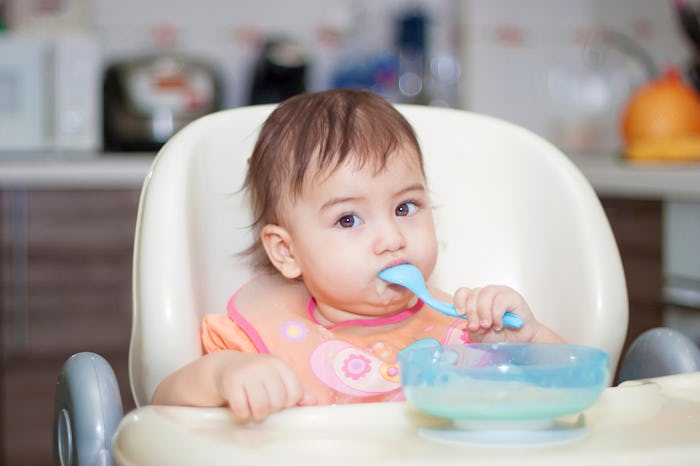Life

Apparently Introducing Solids Too Late Can Impact Your Baby In Some Big Ways
Feeding your baby solid food for the first time is truly one of the more magical experiences in life, and the expressions that cross their faces are pure comedy gold. (Seriously, watching them try to figure out how to move the food around in their mouths and try to "chew" and swallow is pure joy.) However, it's kind of a scary proposition to feed your child something totally new, especially with all the warnings against feeding too early. But what about feeding too late? There are possible repercussions and introducing solids too late can affect your baby later in life.
Deciding when and how to feed your child solid food is a big decision for parents. There's so much cultural influence, as well as what you're being told by the American Academy of Pediatrics (AAP) and your own pediatrician. While there's a ton of research that's not only well documented but also highly publicized on the possible perils of feeding your baby solid foods too early, there's much less on what could happen to your child if you feed your baby too late. As it turns out, there are myriad risks to introducing solid foods too late ranging from stunted growth, as per the The Maternal and Child Health Journal, to putting your child at greater risk for childhood leukemia, as noted by the American Association for Cancer Research.
It sounds dire, but it's good to know there's a sweet spot to start feeding your child solid foods to alleviate a lot of the worry. According to the AAP, it's between 6 and 7 months old, when your baby can sit on their own with good head control.
When I went to introduce solids to my son more than nine years ago, I was met with a surfeit of advice from well meaning family. I heard everything from how they thought I should add rice cereal to my son's bottle at 3 months (The AAP warns strongly against this practice, by the way), to how I should feed my baby puréed pears from a spoon when he wasn't yet 6 months old. It was really hard to go against all of these women whom I'd known to have raised intelligent, strong children — myself being one of them, but the literature of my time cautioned against the practices.
When I started my son on solid foods around 6 months of age, I was once again confronted by well meaning women who told me my son didn't need food yet. He was breastfed, right? Well, that's obviously all he needed right then by their estimation. But I was resolved, so in went the rice cereal and avocado. I had no idea if waiting was good or bad, just that I was ready for my boobs to have a bit of a reprieve.
Introducing solids too late can affect your baby later in life by robbing them of precious vitamins and minerals that feed their bodies during a period of explosive growth, thereby slowing the process and stunting their natural pattern, found a 2011 French study. Also, delaying your child's introduction to solid foods (after 8 months of age) can have a profound effect on their oral motor-sensory skills, according to the Mayo Clinic. The sensory and motor skills needed to eat and speak are learned in the early processes of chewing and swallowing, and limiting this experience can inhibit their ability to learn.
Admittedly, the scariest risk of delaying foods is the possible correlation of delayed oral nutrition beyond breast or formula and lymphoblastic leukemia, which was first identified by a quantitative analysis completed at the Texas Children's Cancer Center. The study found: "These results support our published findings that later introduction to solids is positively associated" with all cases of confirmed late feeding and incidence of cancer. But this data should be taken with a grain of salt. It was an extremely limited group with minimal research of exterior metadata, and the only reason I'm listing it is that it's one of the first risks that pop up when you Google "risks of starting solids late."
The biggest, most tangible concern is of delayed growth. Thankfully, as per the AAP, babies don't actually need a lot of solid foods at 6 months old. A few tablespoons per day of iron-rich foods is about all they need. It's just enough to meet their growing nutritional needs and allow them to learn to eat. Plus it's just really fun to watch.
Check out Romper's new video series, Bearing The Motherload, where disagreeing parents from different sides of an issue sit down with a mediator and talk about how to support (and not judge) each other’s parenting perspectives. New episodes air Mondays on Facebook.